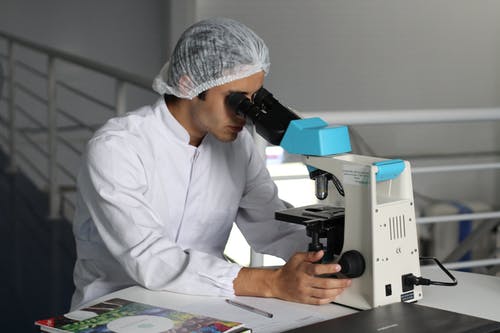Last week a friend who is fantastic at coming up with interesting questions asked me “if it was possible to do a test to see what illnesses you were predisposed to would you do it?”
Without missing a beat I answered with an enthusiastic “hell yes!”
I actually felt the twinge of hot tears of frustration in my eyes as I thought about what my answer truly meant.
If I’d been able to know at 13 years old that all I had to do in order to prevent myself developing the eating disorder anorexia nervosa and spending the next 15 years of my life living in emotional and physical turmoil was to not listen to that advice I was given to eat low fat, oh my gosh how that would have changed things.
How that would have changed everything.
The reality is, that back then I didn’t know.
There is no possible way I could have known what was to come.
Younger Bonnie did the best she could have done at that time.
I am at peace with the fact that it couldn’t have been any other way than what it was.
I am at peace with the knowledge that 13-year-old me took that advice.
I am at peace with the knowledge that she naïvely took plenty of similar terrible (albeit well intentioned) soundbites of advice both knowingly and unknowingly.
I am at peace with the years I lived with anorexia nervosa.
I am at peace with that having been a part of my story.
After all it is undeniable that I gained fathoms from living with anorexia nervosa that I couldn’t have gained had I not lived that chapter.
And still, I would give everything I have if only to have the option to go back and do things differently.
The factors which culminated in my developing and living with anorexia nervosa are numerous. I may never truly know let alone understand them all but ultimately, there were only two things which were necessary to my or anyone else’s developing anorexia nervosa and they are;
- Having a Genetic Predisposition

A genetic basis for anorexia nervosa has long been suspected due to the recognition that those who come from families where parents, grandparents or other relatives have the illness are more likely to develop the illness themselves.
A recent large and well-known genome wide study which compared the entire genome of almost 17 000 people living with or who had recovered from anorexia nervosa with the genomes of 55 000 healthy controls (people without anorexia nervosa) confirmed that there are genetic factors at play.
This study identified differences between the groups at 8 specific locations in the genome.
This means that to date there has been 8 gene variations identified to be associated with increased risk of developing anorexia nervosa and it is likely there are many more.
If you want more in depth information on the genetics behind anorexia nervosa you can click this link to read my earlier blog “Anorexia is Genetic, So What Do I Do Now?” because if you are confused about what this means and you or someone you love is living with anorexia nervosa it is worth understanding this.
Overall, it is important to know that having these genetic differences does not mean it is inevitable or destiny that you will develop an eating disorder.
Having these genetic differences make it possible but they do not make it inevitable.
2. A Calorie Deficit

A calorie deficit is a fancy way of saying not eating as much food as your body requires.
This is the second criteria that needs to be met in order to develop anorexia nervosa.
You can have the first (a genetic predisposition) but if you don’t also experience this one you won’t develop anorexia nervosa.
We don’t know the exact level of undereating which has to be met and, in any case, this varies person to person, we also do not know the point that signals enough time of undereating has passed but we do know there has to be a consistent period of time (i.e. not just skipping a few meals here and there) where there is an intake of food under the nutritional needs of your body to cross into becoming an eating disorder.
Summary

There are only two things which would have stopped me from developing anorexia nervosa and they were 1. if I’d had different genes and 2. If I’d never gone into an extended calorie deficit.
The first one is an impossible option as these were the genes, I was born with, but it is this second one which was entirely possible. At least theoretically.
Meaning there was no necessary reason why at 13 years old in the environment and society I lived in I should have gone into a prolonged period of eating less energy than my body needed.
The food was available to me.
Eating less than my body needed was a thing I did without realising I was doing it.
Eating less than my body needed was a thing I did to cope in a world that seemed impossible.
Eating less than my body needed was a project I assigned myself because the outside world told me in overt, loud and demanding ways as well as covert, hidden and insidious ways that I was not ok as I was.
Eating less than my body needed was a thing I did because the world consistently implied, I was not enough. I didn’t see a possible way of being enough.
Eating less than my body needed was an unconscious attempt to change myself.
Eating less than my body needed gave me a means of pseudo satisfying those parts of me that were relentlessly eager to please, to fit in, to decrease my impact on other people and the planet.
What I know now but didn’t know then is that none of that was my burden to carry.
What I know now but didn’t know then is that narrowing my world to what I was and wasn’t eating was not the answer to any of my problems or any of the world’s problems.
Therefore, while these things didn’t cause my eating disorder they were the cause of the cause. They were the things that supported my going into an energy deficit. They were the gun. The energy deficit was the trigger.
What I’d like you to take away from this post is that the cause of anorexia nervosa comes down to having a genetic predisposition and experiencing a calorie deficit for a period of time.
The first of which we can’t change, the second of which we very much can.
If we are to prevent eating disorders at any large-scale level the media, food industry and many other industries including our health education systems have to change.
Think about how can you be a part of that change?…
How can you be one of the people who doesn’t support the narrative that controlling what you or anyone else eats or the way your or their body looks is the way to being a better person…
What would have helped me recover earlier and likely never fall sick in the first place would have been if I’d have had the space and support to nourish and nurture who I was, to have had the guidance and education around understanding things that seemed impossible to me, to have had the guidance to understand my strengths and to grow, not fear my weaknesses, the boundaries to trust myself to say no and yes when I wanted and the unconditional love to try and to fail. What would have helped is if the world had been kinder. What would have helped would have been to have amazing life and food role models so that I could have been excited to grow up instead of terrified.
Anorexia nervosa is a manifestation, a symptom of so many other things that are not quite right, that we don’t know how to deal with and fears over what has been and what could be.
What would have helped you back then before you fell sick, before you knew there was such things as eating disorders?
Those things can help you now.
You may have lived years of your life with this illness but it’s never too late to learn those things you needed way back then and step out of that way of doing things and into a new life.
A life of mess, heartache, misery, sunshine, rainbows and joy beyond measure.
With my whole heart I hope you found this information useful and inspiring.

Become Great. Live Great.



